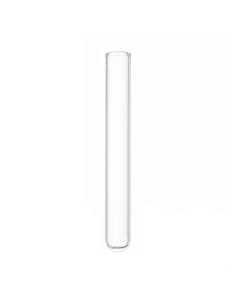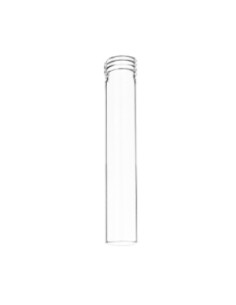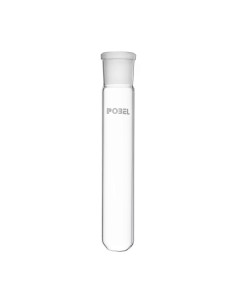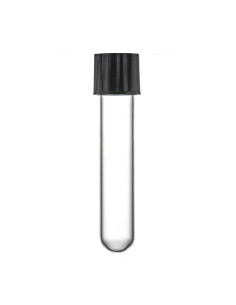Test tubes are tools in any scientific laboratory, enabling precise experiments and analyses. In this article, we will explore the different types of test tubes, their historical evolution, manufacturing processes, specific applications, and how to select the most suitable one for each experiment.
History and Evolution of Test Tubes
Since their inception, test tubes have been essential in scientific research. Originally, they were made from simple glass and lacked the technical specifications of today. With advancements in science and technology, materials like borosilicate glass were introduced, recognized for its thermal and chemical resistance. This evolution has allowed test tubes to adapt to the specific demands of various scientific disciplines.
How Are Test Tubes Manufactured?
The manufacturing of test tubes involves meticulous processes that ensure their quality and functionality.
Glass Test Tubes: these are primarily made from borosilicate glass, known for its high resistance to thermal and chemical shocks. The process begins with melting the glass at high temperatures, followed by molding it into a cylindrical shape and controlled cooling to prevent internal stresses. This material is ideal for applications requiring direct heating and sudden temperature changes.
Plastic Test Tubes: commonly made from polypropylene (PP), a plastic resistant to chemicals and impacts. Polypropylene is lightweight, making it easy to handle, and is autoclavable, allowing sterilization at high temperatures without compromising its structure. This material resists deformation under mechanical stress, ensuring that the tubes maintain their shape and functionality even after repeated use under demanding conditions.
Why Are There Different Types of Test Tubes?
The diversity of test tubes responds to the specific needs of different scientific fields:
- Chemistry: requires tubes that can withstand exothermic reactions and corrosive substances. Borosilicate glass tubes are ideal due to their thermal and chemical resistance.
- Biology and Medicine: preventing sample contamination is crucial. Test tubes with screw caps or ground glass mouths ensure an airtight seal, protecting samples from external agents.
- Microbiology: for microorganism cultures, tubes with characteristics that allow proper growth are used, such as culture tubes with screw caps or polypropylene stoppers.
The Most Common Test Tubes in Laboratories
At Pobel, we offer a wide range of test tubes tailored to various laboratory needs:
- Rimless Test Tubes: made of borosilicate glass, rimless for easy liquid pouring. Ideal for chemical analyses and reactions requiring heating.
- Test Tubes with Ground Glass Mouth: featuring a ground glass mouth for an airtight seal, suitable for microbiological cultures and sample storage.
- Flat-Bottom Test Tubes with Screw Cap: made of borosilicate glass 5.1, with a flat bottom and screw cap for secure closure. Used for heat testing and safe sample storage.
- Screw-Cap Test Tubes: Sterilizable, with a Bakelite screw cap and PTFE gasket. Perfect for temporary storage and liquid sample transportation.
- Culture Tubes with Screw Cap: ideal for microorganism cultivation under controlled conditions.
Which Test Tube Do You Need for Your Experiment?
The choice of the appropriate test tube depends on the nature of the experiment:
- Experiments involving heating: borosilicate glass tubes are recommended due to their heat resistance.
- Sensitive sample storage: screw-cap or ground glass mouth tubes provide an airtight seal, protecting samples from external contaminants.
- Microorganism cultivation: tubes specifically designed for cultures, such as screw-cap culture tubes, provide an optimal environment for microbial growth.
How to Avoid Errors When Using Test Tubes?
To ensure accurate results and prevent setbacks, consider the following:
- Selecting the right material: choose between glass or plastic based on the experiment's needs and chemical compatibility.
- Using appropriate closures: ensure that tubes have caps or seals to prevent contamination or sample evaporation.
- Handling and cleaning: handle test tubes carefully to avoid damage and clean them properly after each use to maintain their integrity and prevent cross-contamination.
Pobel Test Tubes
At Pobel, we take pride in offering high-quality products, made from durable materials and designed to meet the demands of various laboratories. Our test tubes ensure durability, precision, and safety in every application. If you need advice or want to learn more about our products, feel free to contact us. Our team of experts is ready to help you find the right solution for your specific needs.
Frequently Asked Questions
Can Plastic Test Tubes Be Reused?
Yes, polypropylene test tubes are autoclavable and can be reused after proper sterilization. However, it is crucial to inspect them regularly for any damage or deformation that could compromise their functionality.
What Precautions Should Be Taken When Heating a Test Tube?
When heating a test tube, it is important to:
- Use proper clamps to avoid burns.
- Direct the tube opening away from yourself and others to prevent accidents in case of splashes.
- Heat evenly, moving the tube to prevent stresses that could cause fractures.
How Can You Tell If a Test Tube Is Resistant to Corrosive Substances?
Corrosion resistance depends on the tube material. Borosilicate glass test tubes offer high chemical corrosion resistance, while polypropylene tubes are also resistant to many chemicals. It is recommended to check the manufacturer's specifications to ensure compatibility with the substances being used.










